Farmers, fishermen in limbo as Putrajaya mum on new subsidy mechanism
There is also a fear that rising costs will be passed on to consumers if the mechanism does not perform according to expectations.
Just In
A lack of details on Putrajaya's plan for a targeted subsidy for diesel fuel has caused concern among farmers and fishermen, in addition to raising the possibility that rising costs will be passed on to consumers if the new mechanism falls short.
A farmers' advocacy group expressed concern about the plan for the targeted subsidy, especially as there had been no discussions or meetings with the authorities on the matter.
Pertubuhan Persaudaraan Pesawah Malaysia (Pesawah) said neither the government nor the relevant authorities had contacted them to brief them about the new mechanism.
"Even though the government says there are exemptions for the agriculture sector, we are still in the dark as to what is exempted. We have not been informed of anything," Pesawah committee member Abdul Rashid Yob told MalaysiaNow.
The farmers' concerns centre on the transparency and effectiveness of the mechanism and whether it will reach the target group.
Rashid said farmers and fishermen, who are highly dependent on diesel subsidies, would be the first victims if the mechanism turns out to be lacking.
He added that farmers are already struggling with higher operating costs that are disproportionate to their income.
Most padi farmers hire machinery and equipment for sowing and harvesting from contractors, he added.
Each machine can cost between RM4,000 and RM5,000, depending on the size of the field, he said.
"Assuming there is a 20% subsidy for machinery, the rental will go up from RM4,000 to RM4,800 and from RM5,000 to RM5,800.
"It isn't enough that the padi yield has gone down due to the difficult weather, now the cost is also going up," he said.
Rashid said it was important that the implementation of the new mechanism for targeted subsidies is transparent.
"If there is any weakness, it will have a huge impact not only on farmers but on the entire chain of the industry including consumers," he said.
He said food prices would go up as padi seed and rice prices are not keeping pace with rising operational costs.
The government has yet to state when it will implement its planned subsidy scheme.
Singapore's The Straits Times recently reported that Malaysia would abolish fuel subsidies next month and bring the price of diesel in line with the market price.
Economy Minister Rafizi Ramli, who was behind the proposal to remove various subsidies that have flowed to Malaysians over the years, has defended the government's decision to keep the implementation under wraps.
"The government is trying its best to avoid inflationary speculation, so it is best that we keep the sequencing close to our chest," he was quoted as saying by Bernama yesterday.
"The guessing game is to really manage the balance of how the market and society behave."
Rafizi argued that the government's plan to remove blanket subsidies was aimed at reducing the country's fiscal deficit.
He claimed that the government could save RM17 billion if high-income earners were denied fuel subsidies.
Rafizi said those eligible for subsidies would be given a "fleet card" as part of the targeted subsidy mechanism.
He did not rule out the possibility that its implementation could lead to an increase in the price of goods.
Fishermen's fears
Meanwhile, a spokesman for fishermen in Pahang expressed concern over the implementation of targeted subsidies,saying many fishermen would not venture out to sea.

The diesel subsidy for Class B fishing boats was cut by 2,000 litres and Class C by 3,000 litres.
Class B boats may be used within distance of five to 12 nautical miles from the coast, while Class C boats may be used beyond 12 nautical miles from the coast.
"I can assure you that fishermen, not only in Kuantan but all over the country, no longer want to go out to sea," Teoh said.
"Not only is there less fish now and the previous subsidies have been cut, now the government wants to introduce targeted subsidies.
"Fishermen will not go out to sea," he said.
The climate crisis in the form of changing weather patterns has affected tens of thousands of Malaysian fishermen, most of whom are small-scale operators.
In March, Al Jazeera reported that Malaysian fishermen were facing a further decline in their already dwindling harvest.
It said it was a heavy blow to small-scale fishermen "who have invested thousands in a back-breaking trade with often poor returns", citing as an example a single boat which could cost RM14,000, not including the cost of fishing nets, engines and fuel.
Teoh meanwhile warned that consumers would suffer from price increases due to the decline in catch, adding that this could force the country to import seafood.
Subscribe to our newsletter
To be updated with all the latest news and analyses daily.
